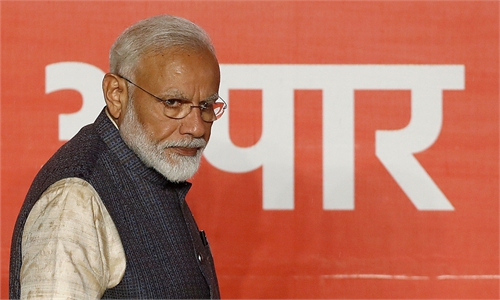
US, India Illustration: Chen Xia/GT
Biden commenced his visit to Asia last week, with a Quad summit scheduled in Tokyo, Japan on Tuesday. Owing to border disputes and an emerging structural competition between India and China, New Delhi has been tilting closer to the US in recent years, with Washington seeking to use it as a leverage to counterbalance China in Asia.At least on the surface, India appears determined to be firm on its involvement with the Quad after the deterioration of its relations with China. At this summit, the US will probably avoid overstating the disagreement with India on the Russia-Ukraine conflict. Zhao Gancheng, a research fellow at the Shanghai Institute for International Studies, believes that the US will focus on increasing its efforts to use India within the Quad framework at this summit. The joint security of the four countries throughout the Indian Ocean is likely to be strengthened in the future, with more frequent joint military exercises aimed at China. India sees this as beneficial to itself and will not only participate in, but also actively host such operations.
However, the US has never engaged in a bad bargain, as its sacrifice and "respect" for India is not only out of self-interest considerations, but also must be paid back. Lan Jianxue, director of the Department for Asia-Pacific Studies at China Institute of International Studies, said that the biggest concession the US could make to India at this summit is to relent on India's weapon import deal with Russia.
After all, the US is supportive of a militarily stronger India as it considers China as its primary opponent, and is using New Delhi as a tool to suppress China. The US is known for having an opportunistic foreign policy, which solely focuses on its geostrategic interests, having nothing to do with the so-called "values" it touts.
In addition, the fundamental purpose of the US in establishing the Quad is to maintain its hegemony, hoping to cultivate India into an obedient partner like Japan, Australia, and the UK, who are loyal to maintaining American global hegemony.
However, when one considers India's original intention of joining the Quad, this amounts to huge differences which create irreconcilable contradictions between the US and India.
Above all, India desires to maintain a degree of strategic autonomy because in the long run what it is eager to achieve is to be truly powerful and even become a first-class superpower. With such an ambition, India would never want to be a pawn of the US like the other two Quad members, who have long fully cooperated and implemented US directives, serving as little more than hatchet men of the US.
This determines that at some point, there will be potential conflicts in both the India-US bilateral relationship and the wider Quad mechanism. The reason for India's active participation in the Quad is to highlight its unique presence as a littoral state in the Indian Ocean, boasting that "it is India who connects the two oceans." But in light of America's intentions in proposing the Indo-Pacific Strategy and establishing the Quad mechanism, India is essentially a supporting character despite its seemingly prominent position in Quad. In particular, the US and its allies are the majority group within Quad. In most cases, the US, Japan and Australia will privately coordinate, align, and reach consensus, while India can only be a vulnerable member on the fringe, in the danger of being used and betrayed at any time, Lan said.
India has a sober judgment. It currently wants to increase its weight in Quad to emphasize its presence as a major power in the Indian Ocean, and seeks to maximize its own needs and national interests by leveraging itself against China to extract funds, technology, and aid from the other three Quad countries. Therefore, the Quad is just one of India's foreign policy tools to engage in international affairs and expand its geopolitical interests, in addition to its active participation in the Shanghai Cooperation Organization, BRICS, and the Bay of Bengal Initiative for Multi-Sectoral Technical and Economic Cooperation. India is simply using Quad as a handy tool and is far from being fully or solely engaged in it.
In conclusion, it is true that the US and India may get closer for the foreseeable future. As long as the development pace of China is not disrupted, the US and India will have the endogenous motivation to get closer to each other. Nevertheless, there are also gaps between the US and India with fundamentally different interests, as India aspires to become a future superpower and the US determined to maintain its hegemonic status.
More importantly, the US-India relationship is also a confrontation between an established power and the emerging power. Currently, India is indeed not capable of challenging America's leadership position in the world. But in the long run, if India grows into a global influential power, the US will not hesitate to suppress and contain India as a strategic opponent.
The author is a reporter with the Global Times. opinion@globaltimes.com.cn



